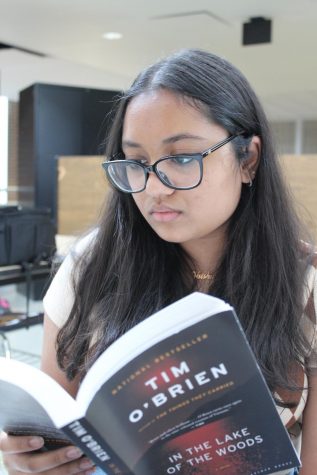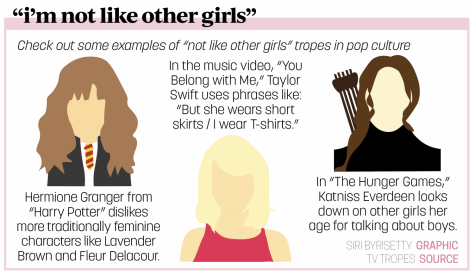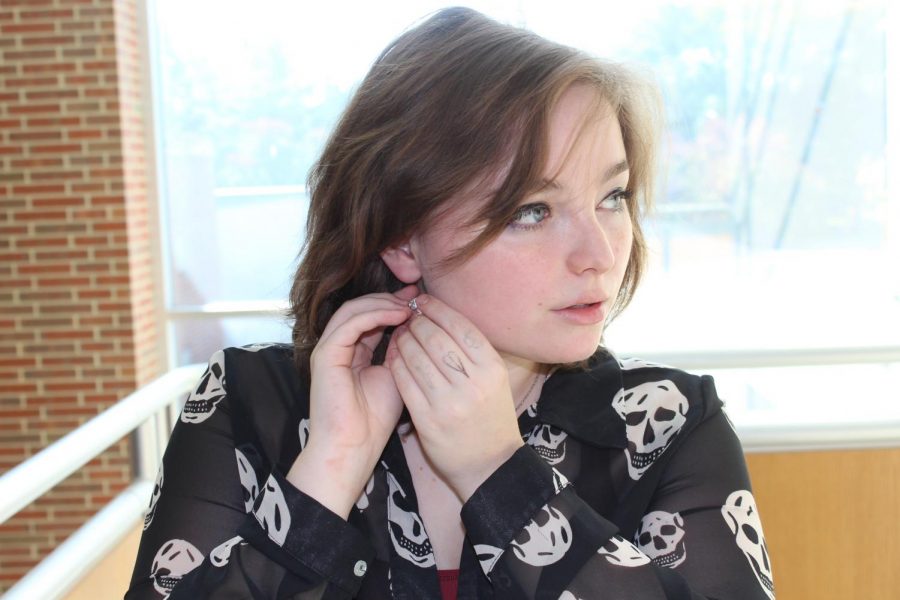Lizzie Farrell, Accents member and junior, said they enjoyed the Princess Day event on Nov. 6 hosted by the Accents.
“I (was) really excited about Princess Day, because it is an event where the entire Accents choir gets together, we get to actually dress up as princesses in a really supportive environment without having to worry about if we’re being perceived as too feminine,” Farrell said.
Farrell, who identifies as nonbinary, said they also enjoy Princess Day because they were confused about their gender identity when they were younger, and being able to let that go for a single day is refreshing.
Farrell said they believe women are judged based on whether they exhibit characteristics perceived as traditionally feminine. They also said they thought women are pitted against other women who do not fit this stereotype.
Farrell is not alone in sensing this issue. Polygon, a gaming and entertainment website, considers a “girly girl” a stereotype that is villainized in media. A character fitting this trope is often in opposition with the less feminine main character that they are cast against.
“That was very confusing for me, I never understood why I couldn’t just have interests that were both masculine and feminine, or why anything that girls do is criticized in some way,” Farrell said.
Sophomore Vaishu Majji, who describes herself as a feminist, said she based a large part

of her view on femininity on what she saw in pop culture when she was younger.
“When I was younger, a lot of the girls who I saw in the media that were very feminine were also portrayed as being the evil or shallow ones due to their love of things that were considered to be more feminine. When I saw these girls and, at times, liked some of the same things they did, I felt like (I) wasn’t allowed (to like those things) because they were bad people, or I felt like I could not like princesses after a certain amount of time, because it wasn’t a serious interest, it was too girly,” Majji said.
English department teacher Emily LeFors said women never manage to escape stereotypes, regardless if they are portrayed as overly feminine or overly masculine, because women are always forced to fit into a patriarchal world.
LeFors said, “When I was younger and watched movies like “Titanic”, which was incredibly popular at the time, I was exposed to a very feminine character in Rose, who was also saved by the men in the movie multiple times, and added to their heroic characterization more than anything. Yet, none of that was ever questioned.”
Majji agreed and said women could be either characterized as feminine for the male gaze, or if they have masculine interests, are portrayed as seeking male validation for their interests.
“I feel like even if a woman has more masculine interests, (she is)often still made to cater to males, because they are somehow this unreachable, effortlessly cool figure that the guys enjoy being around. This characterization is still very much just based on men, and not the interests of women,” Majji said.
LeFors expands on this sentiment by including that women are often stereotyped regardless of whether they fit the description of femininity or not. According to her, a lack of femininity can often be used as a facade for agency.

“In literature such as psychological thrillers, you often have women who are cast as the damsel in distress, even if they are not particularly feminine. (This) label of not being hyper-feminine may be used to distract from the lack of agency which is still present with female characters,” LeFors said.
LeFors said men often showcase women in ways that deviate from what is considered traditionally feminine, and give females masculine interests, which are subconsciously believed to be better.
In agreement, Majji said, “People might act like being feminine isn’t strong, and a strong woman needs to have masculine traits, but really that’s just because men like to think that only masculine traits are strong. (We) are still living in the patriarchy where men are representing (the) so- called ‘strong’ female character and (stereotyping) ‘weak’ female characters by showcasing them as feminine.”
Majji said she also believes these stereotypes of femininity being linked with a lack of strength are used against gay men who are considered feminine. She said that gay men are often labeled as feminine, and ‘not completely men’, so that they can be considered weak. She said, “Apparently anything other than what is masculine would be considered weak.”
Farrell said, “There really is no winning. Society expects women to be feminine, and if they are not exactly like that then they are judged for being too masculine, or ‘other’. But on the other hand, (women) are also judged for being too feminine and not unique or different enough, but events like Princess Day let us forget that and just live in the moment for a little, you know? Just celebrating traditional femininity, which is still strong.”

































![AI in films like "The Brutalist" is convenient, but shouldn’t take priority [opinion]](https://hilite.org/wp-content/uploads/2025/02/catherine-cover-1200x471.jpg)









































![Review: “The Immortal Soul Salvage Yard:” A criminally underrated poetry collection [MUSE]](https://hilite.org/wp-content/uploads/2025/03/71cju6TvqmL._AC_UF10001000_QL80_.jpg)
![Review: "Dog Man" is Unapologetically Chaotic [MUSE]](https://hilite.org/wp-content/uploads/2025/03/dogman-1200x700.jpg)
![Review: "Ne Zha 2": The WeChat family reunion I didn’t know I needed [MUSE]](https://hilite.org/wp-content/uploads/2025/03/unnamed-4.png)
![Review in Print: Maripaz Villar brings a delightfully unique style to the world of WEBTOON [MUSE]](https://hilite.org/wp-content/uploads/2023/12/maripazcover-1200x960.jpg)
![Review: “The Sword of Kaigen” is a masterpiece [MUSE]](https://hilite.org/wp-content/uploads/2023/11/Screenshot-2023-11-26-201051.png)
![Review: Gateron Oil Kings, great linear switches, okay price [MUSE]](https://hilite.org/wp-content/uploads/2023/11/Screenshot-2023-11-26-200553.png)
![Review: “A Haunting in Venice” is a significant improvement from other Agatha Christie adaptations [MUSE]](https://hilite.org/wp-content/uploads/2023/11/e7ee2938a6d422669771bce6d8088521.jpg)
![Review: A Thanksgiving story from elementary school, still just as interesting [MUSE]](https://hilite.org/wp-content/uploads/2023/11/Screenshot-2023-11-26-195514-987x1200.png)
![Review: "When I Fly Towards You", cute, uplifting youth drama [MUSE]](https://hilite.org/wp-content/uploads/2023/09/When-I-Fly-Towards-You-Chinese-drama.png)
![Postcards from Muse: Hawaii Travel Diary [MUSE]](https://hilite.org/wp-content/uploads/2023/09/My-project-1-1200x1200.jpg)
![Review: "Ladybug & Cat Noir: The Movie," departure from original show [MUSE]](https://hilite.org/wp-content/uploads/2023/09/Ladybug__Cat_Noir_-_The_Movie_poster.jpg)
![Review in Print: "Hidden Love" is the cute, uplifting drama everyone needs [MUSE]](https://hilite.org/wp-content/uploads/2023/09/hiddenlovecover-e1693597208225-1030x1200.png)
![Review in Print: "Heartstopper" is the heartwarming queer romance we all need [MUSE]](https://hilite.org/wp-content/uploads/2023/08/museheartstoppercover-1200x654.png)




